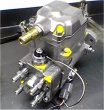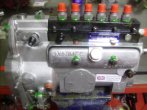The state of a diesel engine can, to some extent, be gauged by how well the engine starts & runs when it is at it’s coldest (first thing in the morning during a heavy freeze is ideal), so when viewing a potential buy ensure you are present for it's first start of the day.
Diesels Pre-2000 would sound a little clattery & slight smoke from the exhaust when starting from cold, but the smoke should of cleared by 1 minute & the engine sound more settled in this time.
More modern diesels should have no smoke when starting from cold (on the whole, though some marques may pass a light haze for 20 to 40 seconds). Heavy exhaust smoke &/or uneven running from cold can suggest a badly worn engine, faulty injectors or (best case scenario) failed glow plugs.
Also worth noting, the modern Earth saving trend is for smaller cc engines, this changes the 'life' of a diesel dramatically. Small cc diesels of 1.6 litres & less have far shorter lifespans than engines of higher litre capacities. So buyer, beware! Once upon a time 150k miles on a diesel would be not too worrying, but 150k miles on a 1.3CDTI Corsa is pretty much ready for the scrap heap, sad, I know, but it wasn’t my idea!
Over the years we have had the opportunity to test various engine oils on many vehicles.
Fully synthetic oils are 'pushed' as the ultimate choice but we beg to differ.
Fully synthetic oils are too 'thin', this results in oil leaking past valve stem seals and past turbo seals resulting in blue smoke at start up and oil in inlet/boost pipes.
We personally use and advise that a semi-synthetic oil is used with a rating of either 10/40 or 15/40, these oils are more viscous and are less likely to weep past seals. These oils also deaden engine 'tapping and ticking' sounds.
We have yet to decide the best oil, but will add this info at a later date.
Click here for more information on Engine Oil.
A clogged or partially clogged air filter will create an all manner of problems such as power loss, black smoke, reduced mpg figures, failure of the MOT smoke test. It is imperative that the air filter is renewed at the recommended service intervals and more often than recommended if the vehicle is used in dusty conditions (not normally a problem in the UK!).
We strongly recommend using either a genuine replacement filter or one from a reputable manufacturer, like everything these days dirt cheap parts are available but cost cutting engine parts is false economy.
Also, blowing out the air filter with an air line really is not a good idea.
EGR (Exhaust Gas Recirculation) systems where added to the diesel engine to reduce exhaust emissions when the engine is idling or under partial load. Exhaust gas is dumped back (via a valve arrangement) into the inlet manifold where it is again 're-burnt' and in theory cleans the exhaust gases. An excellent idea in theory and on paper BUT once the engine has been in service for a few years the EGR system and inlet manifold become caked in soot reducing air flow, increasing emissions and reducing power and mpg figures. Once the problems manifest themselves it is recommended that the EGR parts and inlet manifold are removed and cleaned (steam cleaning and physical scraping) to remove all the carbon and gunk. There are 'wonder aerosols' available that claim to clean out the EGR system. These aerosols have very limited effects and have the potential to cause damage. The only way to do the job properly is to remove the parts and 'get involved'. Deactivating the EGR system is another option but not all vehicles will allow this to happen as the engine management light will illuminate.
Often overlooked but tyre pressures are a key player in economy figures.
Check and inflate tyres to correct pressures at least once a fortnight, pressure figures will be in vehicle handbook.
Very wide tyres will reduce economy, though look pretty cool.
Continual changes to the blends of diesel fuel have resulted in a modern fuel that is much less lubricating. This lack of lubrication is having an adverse affect on the overall lifespan of diesel injection equipment, causing damage to injectors and fuel pumps.
A common practice is to add oil to the fuel at each fill up to provide added lubrication and theoretically, prolong the injection equipments operating life.
Using full mineral engine oils, hydraulic oils and 2 stroke oils are the more common options. This practice is perfectly safe and advisable for diesels WITHOUT a DPF system, however, one must be very, very careful when a DPF system is fitted. Adding the wrong oil or too much oil to the fuel has the potential to damage a DFP, which is an invariably expensive fix.
An easy mistake to make but a potentially expensive mistake!
Older diesels (pre 2001) would normally just require a total fuel system drain, new fuel filter, bleed fuel through and 95% of the time there are no problems.
Modern diesels, on the other hand, do not fare so well.
Petrol has no lubrication qualities and can instantly wear out/seize injection components.
Should a petrol mis-fill occur and it is realised before starting the engine DO NOT start the vehicle, have the fuel tank drained before even contemplating running the engine.
On occasions where the mis-fill was not identified until the vehicle is started there are two scenarios:
Total cut out, will not restart:
This is the worst case as it is likely severe damage has been done. In these cases it really is a keep your fingers crossed situation. A full tank drain must be carried out along with new fuel filter and a pressurised bleed through. It is then a case of praying that the engine will run with no misfires or smoke. Should there be smoke, misfires or the engine will not run then removal of the fuel system components will be requires for inspection.
Loss of power, exhaust smoke (usually grey/blue), starting can be difficult:
In these cases the petrol has diluted the diesel down and you may be in luck. As above, a full tank drain, new filter and full system bleed is required. Once completed and you are lucky, your diesel may well start and run just as before.
Agricultural diesel or 'red diesel' is tax reduced fuel for use in tractors, boats and other industrial / plant machine applications that rarely or never drive on public roads.
Red diesel was always supposed to be standard 'white diesel' with a red dye added as a marker, used for easy detection for those wonderful folk in uniforms!
Kerosen is basically aviation fuel and used as the heating oil doe home central heating where gas is not available.
Both these oils can be used in any diesel engine and the engine will run, in most cases, just as it would with white diesel.
However...
Unfortunately we do not process the relevant chemistry set to check the exact 'make up' of red diesel in comparison to white diesel, but our many years of experience with fuel systems has shown that red diesel is NOT the same as white diesel. Red diesel appears to an inferior fuel to white diesel, it appears to lack even more lubricating properties than white diesel. We receive dozens upon dozens of diesel injectors and fuel pumps that are 'worn out' and yet have only covered average mileages of between 60-80k miles and yet, looking at the wear rates one would assume the components have covered more like 300k miles minimum! This accelerated wear effect is also seen when people use kerosene in the diesel vehicles. Kerosene contains virtually no lubricating properties at all, so injection component damage is inevitable.
There are a number of running problems that indicate something is 'not quite right'.
BLUE SMOKE from exhaust - Causes: Engine is burning engine oil, injection timing is incorrectly set.
BLACK SMOKE from exhaust - Causes: Too much fuel is being delivered to the engine or the fuel that is being delivered is not correctly atomised, Exhaust Gas Reciculation (EGR) system has failed or is incorrectly set of has become clogged with soot.
WHITE SMOKE from exhaust - Causes: If the ambient temperature is low, steam which is normal and usually clears, if the smoke never clears, water is entering the engine (cylinder head, head gasket, liner problem).
GREY SMOKE from exhaust - Causes: Injection timing is incorrectly set, fuel is not being atomised correctly, something other than diesel has been added to the the fuel tank.
METAL PARTICLES FOUND IN FUEL FILTER - Cause: Injection components have begun to disintegrate.
ENGINE MANAGEMENT LIGHT (MIL) ILLUMINATES - Cause: The engines ECU has picked up a fault, requires the vehicle to be plugged into a diagnostic code reader to identify/locate the fault.
VEHICLE GOES INTO 'LIMP MODE' - Cause: A serious fault has occured, requires the vehicle to be plugged into a diagnostic code reader to identify/locate the fault.
Should you require your diesel vehicle diagnosing, repairing or tuning contact our neighbours, Ribble Valley Diesels on 01254878353.
 |
 |
 |